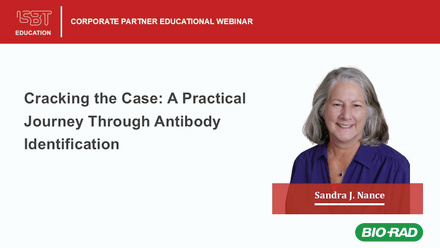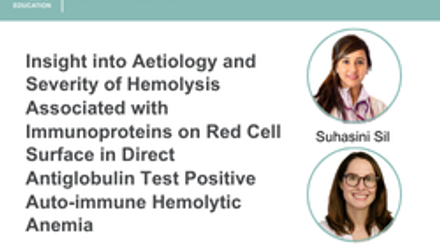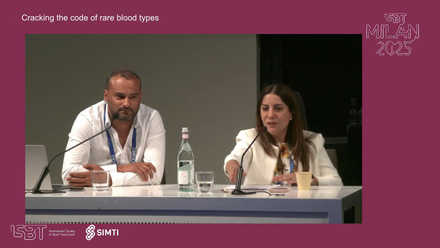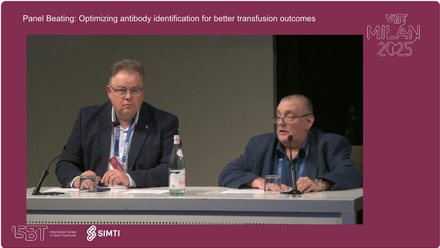The Fetal Maternal Immunology session included the following presentations:
1. Cecile Toly-Ndour: Rh disease prevention for women with partial D: is routine antenatal anti-D prophylaxis useful?
2. Mees Bruin: Natural course of pregnancies with alloantibodies against human platelet antigen HPA-1a
3. Renske van 't Oever: Natural course of hemolytic disease of the fetus and newborn after pregnancy with intrauterine transfusions
4. Jonas Lowack: HLA class I antigen knock out endothelial cells, a tool for the detection of endothelial-specific anti-HPA-1a alloantibodies
5. Xueyu Jiang: Pre-administration of baicalin inhibits red blood cell immunization in a mouse model of red blood cell transfusion
6. Ellen van der Schoot: Fetal RHD genotyping by droplet digital PCR for D variant mothers or children
MODERATORS: Agneta Wikman, Alan Lazarus
After the presentation, there was a questions and answers session, which is also included in the recording.
Abstract
HLA class I antigen knock out endothelial cells, a tool for the detection of endothelial-specific anti-HPA-1a alloantibodies
J Lowack1, H Berghöfer1, R Dammann2, U Sachs1,3, B Bayat1
1Institute for Clinical Immunology, Transfusion Medicine and Haemostasis, 2Institute for Genetics, Justus-Liebig-University, 3Department of Thrombosis and Haemostasis, Giessen University Hospital, Giessen, Germany
Background: The scariest consequence of anti-HPA-1a mediated FNAIT is intracranial haemorrhage (ICH). Studies have shown that endothelial-specific anti-HPA-1a alloantibodies play a major role in FNAIT-mediated ICH. It is believed that these subtypes of alloantibodies target αvβ3 on endothelial cells, which affects endothelial function. These endothelial-specific alloantibodies are detected using standard methods such as monoclonal antibody immobilization of endothelial antigens (MAIEA) and flow cytometry. During pregnancy, anti-HLA immunization has been documented in 54.4% of women which increases with the number of pregnancies up to 74%. However, both detection and functional analysis of endothelial-specific anti-HPA-1a alloantibodies are highly affected by the presence of anti-HLA class I alloantibodies in serum.
Aims: The current study aims to overcome the effects of anti-HLA class I antibodies on the evaluation of endothelial-specific anti-HPA-1a alloantibodies.
Methods: A CRISPR-Cas9-PITCh system to delete exons 2 and 3 of the beta-2-microglobulin gene (B2M) and thereby eliminate HLA class I surface expression was designed. An endothelial cell line (EA.hy 926) was transfected with this CRISPR-Cas9-PITCh system. Analysis of transfected EA.hy 926 cells detected the absence of HLA class I in about 2%–3% of total cells. Using mAb W6/32, HLA class I negative cells were single-cell-sorted and further cultivated. To confirm the HLA class I elimination, exons 2 and 3 of the B2M gene were amplified from the genomic material of sorted cells (HLA class I deficient) and compared with wild-type cells in PCR. The type of HLA class I on wildtype EA.hy cells was determined. Finally, binding of the matched anti-HLA class I antibodies in serum (n = 10) to wild-type and transfected cells were evaluated in a MAIEA assay and compared to a negative control.
Results: In contrast to wild-type cells, specific primers for the B2M gene amplified a PCR product of 535 bp, indicating the absence of exons 2 and 3 in transfected cells. Further evaluation of HLA class I expression on the cell surface in flow cytometry using mAb W6/32 showed no binding on transfected EA.hy cells. The HLA class I genotyping of wildtype EA.hy cells revealed expression of HLA class I types A*24, 25, B*15 and C*03. Analysis of sera containing HLA-matched anti-HLA class I antibodies with wild-type cells and HLA class I KO cells in the MAIEA assay showed no reactivity of these sera with HLA-class I KO cells (mean OD 0.2–0.5), while exhibiting a strong reactivities with wild-type cells (mean OD 3.4–3.9).
Summary/Conclusions: These results showed that the B2M gene deletion does not affect the proliferation and growth profile of HLA class I KO EA.hy cells. However, the absence of HLA class I makes these cells suitable tools to evaluate the binding of endothelial-specific anti-HPA-1a alloantibodies in both HLA class I positive and negative sera. Furthermore, HLA-Class I KO EA.hy 926 cells can serve as an effective tool to analyse the sole functional relevance of endothelial-specific anti-HPA-1a alloantibodies implicated in the mechanism of ICH without the effect of HLA class I antibodies.






















